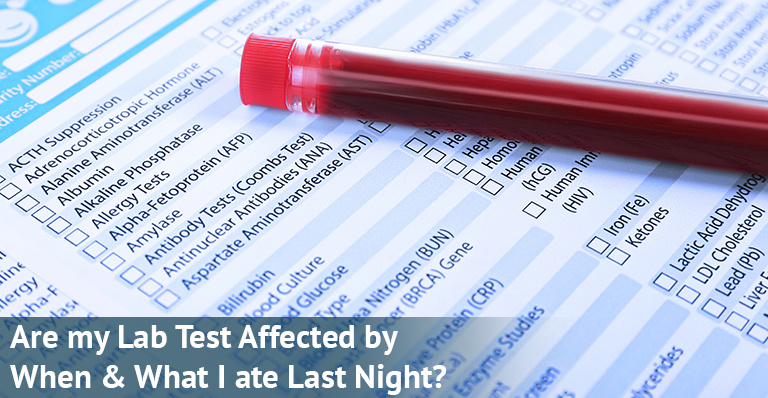What and when a patient eats the night before can have an effect on their medical lab results. Eating late or eating foods high in protein or fat can cause the fasting blood levels to be elevated.
Blood tests are done to check abnormalities in blood. Though these tests look clear-cut and uncomplicated, but they’re amazingly easy to tilt. This mostly depends on the type of blood test a person is going to have the next morning. Most of the times a patient can eat and drink normally before the tests, whereas there are cases in which a patient is instructed not to eat or drink before the test, these tests are known as fasting blood test.
Each blood test is independent, so it is essential to ask the doctor to confirm if you should fast before the test or take any other precaution (many tests require a patient to avoid a certain type of foods even 5-7 days before a test is conducted). So fasting may be important because what you eat may change test results. Incase the confusion persists; call Healthians representative to know details. If the health care provider has confirmed that a patient should not eat anything before the test, then the instructions should not be ignored.
Guidelines for fasting blood tests:
- It is important not to eat anything at least 8 hours prior to the test except water.
- For Lipid test, fasting should be done for at least 12 hours before the test. Water is allowed though.
- Patients should not chew gum, smoke, or exercise before the test because all these activities can stimulate the digestive system and affect the test results.
- Alcohol should be avoided for at least 24 hours before the test as it can cause a drop in the sugar level, can alter the enzyme level & can elevate liver function test results.
- Prescription based medications can be taken unless the doctor advises against it. Certain medications, especially birth control pills can change the cholesterol levels, so it is advised to stop taking them for a few days before the test.
How are the results altered?
Some test values get affected following digestion of food. After the food is digested, higher levels of glucose remain in the blood for some time. For example, in the case of fasting blood sugar, our own glycogen (if we have not eaten in a while, sugar from the liver in our body is used) is enough to raise the blood sugar for the fasting test.
Below are examples of few common blood tests and what a patient might need to do to prepare for them, including the fasting period:
Lab Test: Fasting Blood Glucose Test
Instructions: Patient is advised not to eat or drink anything except water for 8 to 10 hours before a fasting blood glucose test.
Effect on Lab Results: If you eat sugar before getting your blood sugar tested, you will get an inaccurate reading.
Lab Test: Iron Blood Test
Instructions: Taking iron pills or tablets for 24 hours before the test should be avoided.
Effect on Lab Results: Our body absorbs iron very quickly from food or pills, so this can result in raised levels of iron and affect the test results.
Lab Test: Blood Cholesterol Test
Instructions: Fasting for 9 – 12 before the test is instructed.
Effect on Lab Results: Eating a large amount of food that is high in cholesterol can raise levels of cholesterol in the report.
Lab Test: Gamma-glutamyl transferase (GGT) Test
Instructions: Fasting is not required for this test, the patient is instructed to avoid alcohol consumption.
Effect on Lab Results: Alcohol consumption can alter the enzyme levels.
Lab Test: Test For Stomach Or Bowel
Instructions: Person is advised to take a liquid diet the day before the test.
Effect on Lab Results: Lab results are not affected.
Lab Test: Complete Blood Count
Instructions: Fasting is not required.
Effect on Lab Results: Lab results are not affected.
Important: Fasting should be for least 8-12 hours, depending on different tests, but a fasting period more than 14 hours is not recommended as it negatively impacts the results.




